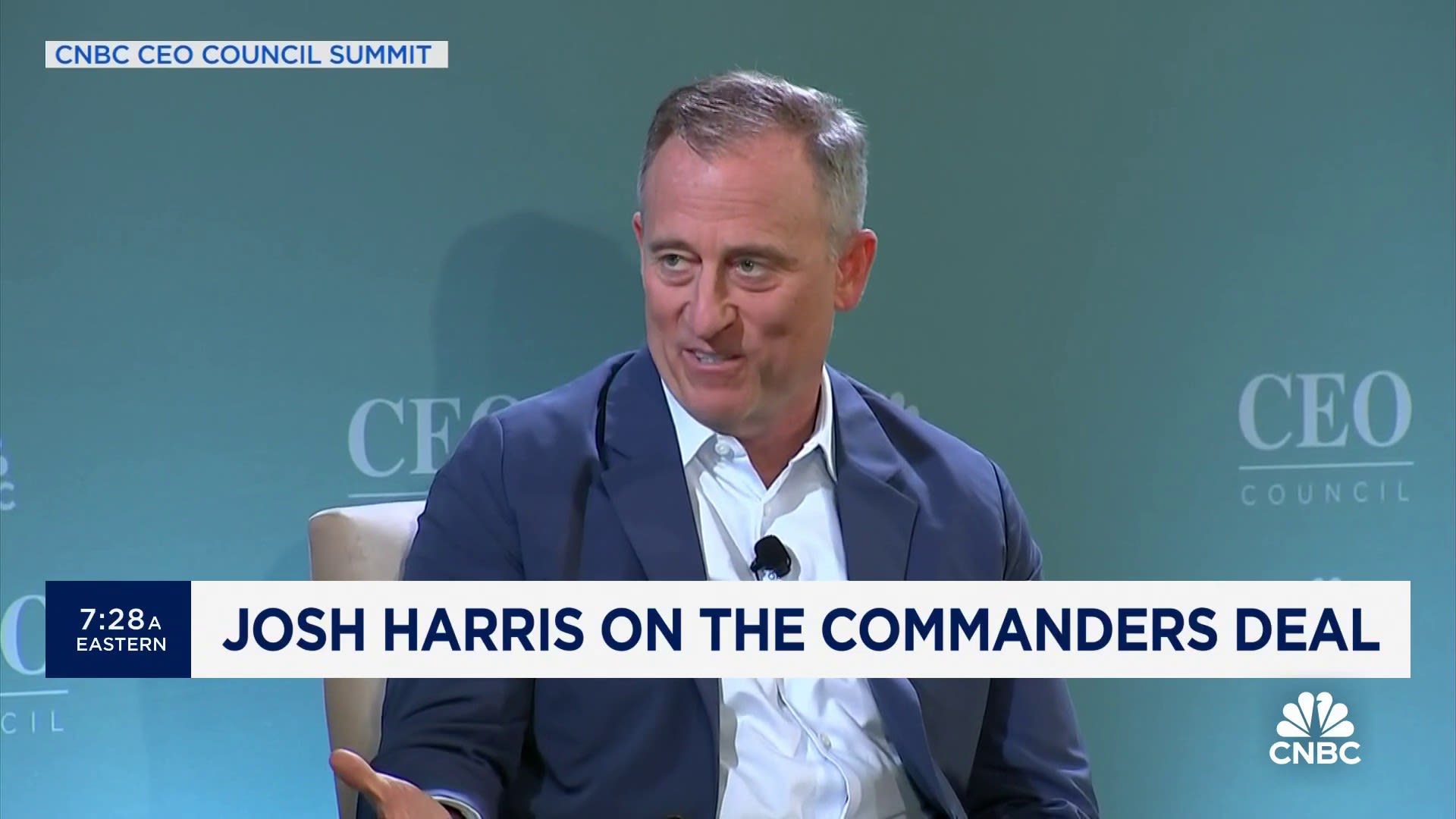Josh Harris poses for a photo during the 2024 CNBC CEO Council Summit in Washington, D.C. on June 4, 2024.
Shannon Finney | CNBC
In 2023, private-equity investor Josh Harris headed a group that paid $6.05 billion for the Washington Commanders, which still stands as not only the most money spent to purchase an NFL team but any professional sports team.
Harris, who owns several other sports teams including the NBA’s Philadelphia 76ers, the NHL’s New Jersey Devils and the English Premier League’s Crystal Palace — and has struck hundreds of deals as one of the founders of Apollo Global Management — said the deal to acquire the Commanders “was one of the hardest deals” he’s ever been a part of.
While part of that was driven by the fact that Amazon founder Jeff Bezos was also a bidder for the team, former owner Dan Snyder and the issues that surrounded his tenure, and the normal challenges of buying one of the NFL’s 32 teams, simply putting together the capital to buy the team was a huge hurdle.
“Unless you’re one of the wealthiest 50 people [in the world], writing a $5 billion equity check is pretty hard for anyone,” Harris told CNBC “Squawk Box” co-anchor Andrew Ross Sorkin at the CNBC CEO Council Summit in Washington, D.C., on Tuesday. To buy the team, Harris helped put together a 20-person group that includes NBA legend Magic Johnson, former Google CEO Eric Schmidt, and David Blitzer, the Blackstone Group senior executive who had partnered with Harris to buy the 76ers and Devils.
Harris said the process “created a little bit of a wake-up call at the NFL,” adding that existing NFL rules regarding putting together groups to buy a team “are restrictive.”
“Raising that amount of capital was unique; it had never been done before,” Harris said. “I think it may be leading to some rethink into the consideration of letting private equity, as an example, or institutional investors into the NFL.”

As the business that surrounds sports has continued to grow, so too have team valuations, in some cases 10% to 15% annually. In 2018, hedge fund manager David Tepper set the then-NFL record for a team purchase when he spent $2.275 billion to buy the Carolina Panthers. In 2022, an ownership group led by Walmart heir Rob Walton bought the Denver Broncos for $4.65 billion.
That trend of rising team prices is happening across sports, with United Wholesale Mortgage CEO Mat Ishbia paying $4 billion to buy the Phoenix Suns in 2022, eclipsing the then-NBA record of $2.35 billion paid by Joe Tsai for the Brooklyn Nets. Hedge fund manager Steve Cohen paid $2.4 billion for the New York Mets, passing the then-MLB record $2.15 billion Guggenheim Baseball Management paid for the Los Angeles Dodgers in 2012.
Harris noted that while the growth of the underlying businesses of the teams and media rights has kept valuations growing and cash flows high, the capital-intensive nature of running a team has grown too, between player salaries, staff and the cost of maintaining or building an arena or stadium.
“You need capital, and so freeing up other sources of capital to help grow these businesses is the right answer,” Harris said.
While U.S. pro sports leagues had prohibited private equity investors previously, they’ve largely softened their stances in recent years, aside from letting any firm be a controlling owner of a team.
However, the NFL is still against PE ownership, a position that is currently under review by the league as team values have continued to rise.
“We’ve got a lot of interest in the private equity space,” NFL Commissioner Roger Goodell said at the league’s spring meeting in May. “We are making real progress on potential private equity. We’re going to continue to be very deliberate, but I expect there to be something by the end of the year.”
Goodell said at the meeting that the league’s owners agreed to raise the debt limit for franchise acquisition to $1.4 billion, an increase of $200 million and another challenge that Harris noted in the purchase of the Commanders.
Ross Sorkin asked Harris if allowing private equity investors into sports would have any negative impacts on the teams or the league’s overarching strategy as those investors look toward an exit.
Harris noted that in the NBA, institutional investors can’t be controlling owners and “no one can force an exit; the primary owner decides pretty much everything.”
Stanley Kroenke, who owns several professional sports teams including the NFL’s Los Angeles Rams, said at the CNBC x Boardroom Game Plan Summit last year that rising NFL team values are now getting out of reach of even billionaires, and that is an issue the league is watching and where he has been among owners pressing for new thinking.
“I’ve told them we will have to relax some of the rules. … The NFL is a league of rules, we have lots and lots of rules, and lots of people agree with me, but won’t do anything,” Kroenke said.
The sky-high valuations will put more pressure on the league to find a solution, Kroenke said, because the NFL valuations are so different today than when he first got into the league.
While the entry of more professional investors into sports has certainly changed the business that surrounds it, Harris said there still is a significant difference between the business world and sports.
“In business, the key is EBITDA or stock price. In sports, it’s about winning games and delivering championships for the city; the second job is to create memories and be a steward to these franchises,” he said.

